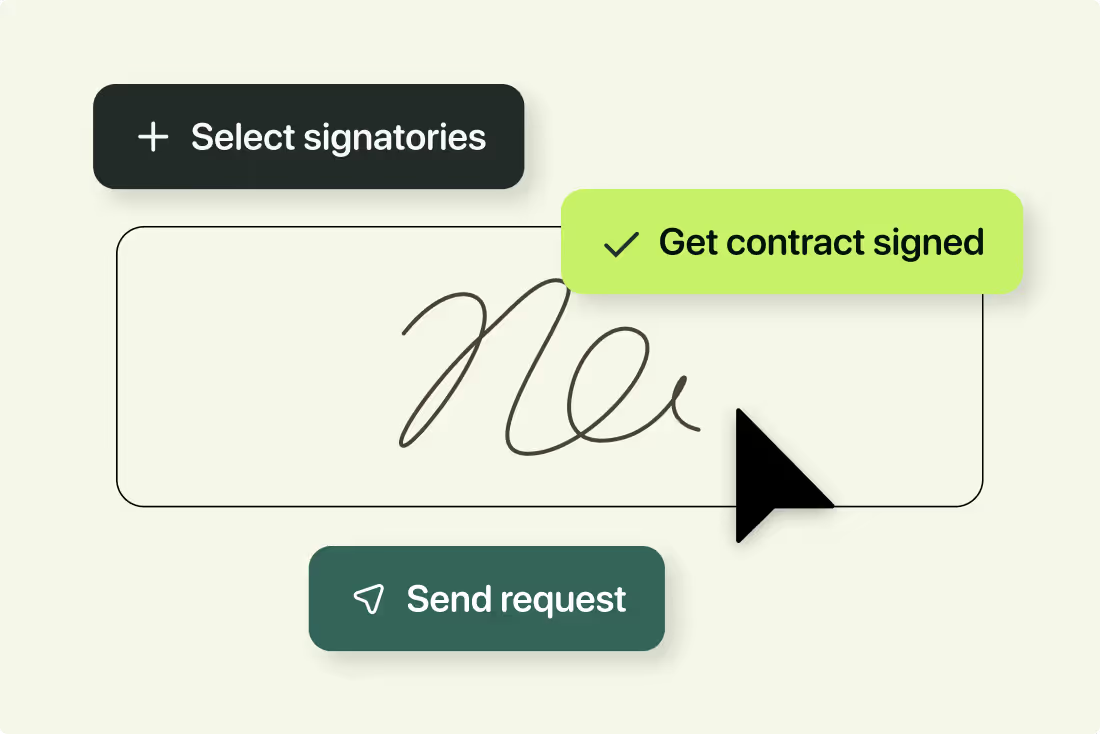Solutions
Customer Support
Resources
Too often, businesses only view contracts as a formality, and they fail to recognize the true value that sits within a contract’s data.
This explains why contracts get lost and buried post-signature. Businesses file signed contracts away, hoping that the new relationship runs smoothly and they’ll never have to reach for it again.
However, in doing so, they're failing capture and track important contract data like contract value, deadlines and obligations.
Contract data is a term used to describe the information contained within a contract. It covers everything from clauses, signatures, pages and specific details within a contract, like dates, contract owners, contract types and contract values.

Contracts are merely seen as a legal requirement in most organizations, and the details within them are often only relied on before the courts if something goes wrong.
But this data can prove transformative if captured and examined properly, making it quicker and easier for legal and business teams to get future contracts across the line.
The case for capturing contract data is a strong one. Finding an efficient and meaningful way to capture data from contracts can have an immediate impact on your bottom line. Here’s how.
With negotiation data preserved and captured, you can get real-time insights on your contract workflow’s efficiency.
Which templates typically lead to the longest contract lifecycle? Which clauses usually block signing? Which business colleagues make the most edits? How do contract approval rates change over time?
Capturing the right contract data will enable you to answer these questions, not only to improve your processes, but to be accountable to your colleagues in other teams too.
Search might seem like an unsexy feature, but a powerful search mechanism can have a huge impact when it comes to response times and efficiency. And as a scaling business, having this time back can be game-changing.
If your contract data is properly structured, users can search for documents by team members, dates, company names, clause titles in seconds.
{{quote1}}
But without structured data, your ability to search contracts for certain contract metrics will be extremely limited. Often, it will begin and end with the file name and the modified/created dates.
For anything beyond this, you’ll need to be prepared to dedicate hours trawling through individual contracts - an administrative task that will take lawyers away from higher-value work. Alternatively, you'll need to outsource the work, which can come at a considerable cost.
Another benefit of capturing contract data is that it can be used to inform strategic decisions. In fact, contract data can be essential when making informed decisions on the following things:
{{quote2}}
The default currency for contracts, with almost 100% market penetration, is a product that was never designed for legal documentation: Microsoft Word.
People create contracts in Word, often by copying and pasting parts from old documents, and then make tracked changes, bouncing around between different versions via email. At some point, everyone’s happy and the document becomes a PDF.
This PDF jumps into various email chains until it’s printed, signed and scanned, or perhaps signed electronically with a tool like DocuSign, or a DocuSign alternative. It’s then saved on a shared or personal drive, where it sits pretty much forever.
There are lots of problems with this process: it’s hard to collaborate, it’s inefficient, it takes a long time and version control is difficult. But a key problem, that only increases as time goes on, is data loss.

In the process described above, almost none of the data on contract collaboration is retained:
Generating all this collaboration data, only to discard it throughout the process, is a huge waste of lawyer time and expertise. The main reason why so much data is lost throughout this traditional workflow is that the data generated in static Word and PDF files is unstructured.
Key fields like dates and signatories aren’t tagged with metadata, so when the document passes to a new system, that system can’t differentiate between important and less important information.
This makes it almost impossible to have a genuine audit trail of a legal document’s journey from inception to agreement. Who made which edits, when, why, and how - all of this is either never captured or lost along the way. Without data to identify problem clauses and contract negotiation bottlenecks, they are almost certain to reappear next time.
But what should businesses do to overcome these challenges? Let’s see.
There are hundreds of contract metrics you can track, and trying to chase all of them will be an endless pursuit. It’s far more efficient to only focus on the contract metrics that move the needle.
Ask yourself: which numbers have a direct impact on revenue? Which numbers tell us how efficient our current processes are? Which metrics are useful beyond the business’ legal function? Which metrics are critical from a compliance perspective? Are there any legal KPIs might enhance your team’s performance?
Once you know the answers to these questions, find out whether you can extract this data from your contracts, and how. To help you identify which contract metrics matter most to your business, get out our guide to the key contract metrics.

Next, you need to make sure the way you store contracts (and their data) is secure, consistent and accessible.
This is where a centralized contract repository comes into play. One of the biggest contract management mistakes we see in businesses is poor contract storage.
That means contracts stored across multiple drives, with multiple versions and in multiple formats. How can you extract your contract data when you don’t even know where to find your contracts to begin with?
Fortunately, contract management systems like Juro offer a secure contract repository, allowing you to store your contracts in one place and creating a single source of truth for contract data.
For example, Juro’s contract automation software provides a smart storage solution for contracts whereby users can locate the document they need instantly using a powerful search function. This makes it easy to locate contract data.
The best approach to contract data extraction is to create contracts as data to start with. This sounds complex, but it doesn’t have to be.
Legal and commercial teams can create contracts as structured data in Juro using automated templates developed by legal. The smartfields you populate in a contract template form metadata that can be extracted, compiled and queried in seconds. You'll also be able to make contract smartfields compulsory, ensuring that critical contract data is always included within a legal agreement.

Once you’ve implemented a robust system like Juro to automatically tag and capture your contract data for you, you need to decide what you’re actually going to do with it.
Who will be responsible for reviewing which metrics? Do you have a contract manager that will monitor the contract data? How will the contract data be shared to inform other business functions? Who will have access to the contract data and when?
These are important decisions and ones which need to be communicated effectively throughout your organization, usually using a contract playbook or something similar.
Contracts created in Juro's intelligent contract automation platform are build as structured data by default, making them fully searchable from day one.
And with Juro's AI Extract functionality, you can now process vendor agreements and extract key datapoints from third-party agreements in seconds. Simply add your tailored playbook and let the AI locate and extract the most relevant datapoints for you.
But that's not all. You can populate smartfields in seconds, then trigger workflows, automate calculations, translation, summaries, and more.
ANC's Contract Manager, Kyle Piper, is already reaping the benefits of AI-powered contract data extraction:
{{quote3}}
Best of all, this happens in the same workspace you create, negotiate, approve, sign, track and renew contracts. Less context-switching, and more time to focus on the strategic work that matters most.
Juro enables teams to store, and monitor their contracts in a data-rich contract repository, making it easier to track contracts and minimize risk. If this sounds like a solution your business would benefit from, fill in the form below to find out more.

Lorem ipsum dolor sit amet, consectetur adipiscing elit. Suspendisse varius enim in eros elementum tristique. Duis cursus, mi quis viverra ornare, eros dolor interdum nulla, ut commodo diam libero vitae erat. Aenean faucibus nibh et justo cursus id rutrum lorem imperdiet. Nunc ut sem vitae risus tristique posuere.

